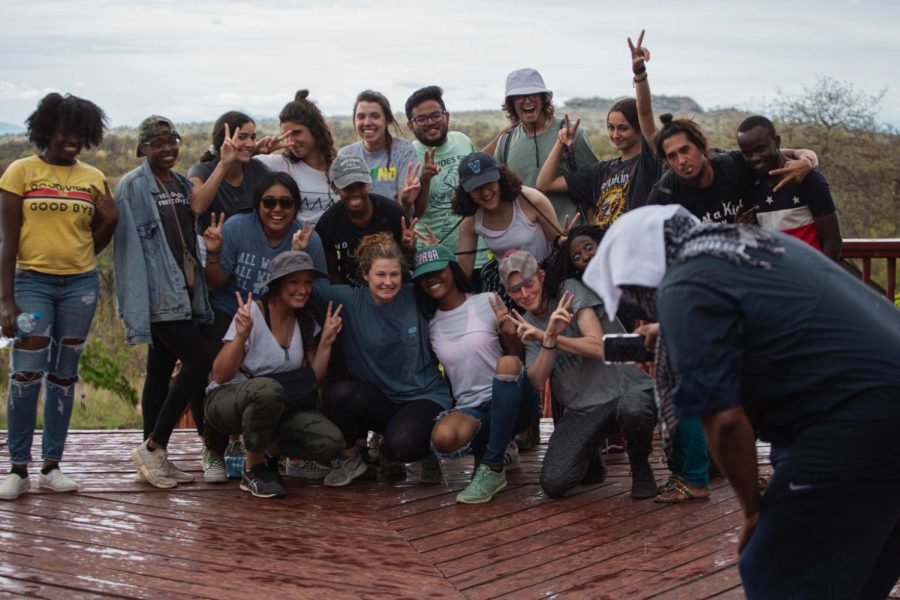University Social Justice Documentary “From the Group Up” Sheds Light on the Global Water Crisis
The Glass Rose Films crew on site in Tanzania
April 30, 2020
Sixteen University students have produced a documentary, entitled “From the Ground Up,” highlighting the harsh realities of unequal access to clean water. The students, who are also members of the student production company Glass Rose Films, traveled to Tanzania in October or 2019 to film their documentary.
The film is part of the annual social justice documentary course taught by Hezekiah Lewis, Assistant Professor of Communication. The film was originally set to be premiered at an in-person screening during the spring. Due to the ongoing novel coronavirus pandemic, the documentary debuted on Glass Rose Film’s website on April 23. The team also produced a short behind-the-scenes look into the production of the film that followed the documentary’s premier.
“From the Ground Up” is available to watch for a minimum donation of $5, with the proceeds going to a fundraising initiative to build two water wells in Tanzania. The pay-per-view documentary can be accessed through the production team’s website by clicking the “Rent Now” button. An official in-person screening will occur at the University’s Center for the Performing Arts in September.
During the crew’s two-week stay in Tanzania, students followed the life of a woman named Adija and her community in Malolo, Singida. Malolo suffers a severe lack of clean water, and the documentary focuses on Adija’s daily life as a woman and leader. Adija not only prepares meals for the children and washes all the dishes, but she walks to the hole in a ground where she and other residents of Malolo retrieve their water. Adija is not the only woman who holds these responsibilities, as it is common amongst women who live in communities lacking access to clean water in the arid regions of Singida.
“This film is so much more than a documentary,” Will Brenninkmeyer, one of the film’s directors, said. ““From the Ground Up” is an intimate and immersive experience that can and should evoke a sense of injustice and global responsibility in each and every viewer. This is a film about love, the triumph of perseverance over struggle, and the value of our world’s most precious resource: water.”
The production of the documentary began with a partnership with the Chris Long Foundation’s Waterboys initiative to become educated about clean water projects occurring in Tanzania. Waterboys connects players and fans of the National Football League to provide clean, accessible drinking water to rural communities and villages in Tanzania. The Glass Rose Films team worked with the Waterboys in order to connect with local government contacts in Singida. Translators of Worldserve International also assisted in creating connections that allowed for filming of the documentary to take place.
“The global water crisis is only just beginning, with more and more people in all parts of the world going without access to the clean water that everyone deserves,” Kathleen Connors, Glass Rose Films crew member, said. “We want to highlight the value of our most key resource that is water.”
The students wish to convey to their audience the impact they too can have in aiding these communities.
“When we first sat down together to talk about our individual goals and aspirations for how this story would be told, it became very clear that each of us wanted to create something personal,” co-directors Will Brenninkmeyer and Trent Zulkiewicz said. “We wanted something that would allow the audience to not just become aware of an issue, but to actively engage with it, to question its causes and to be impacted by its reality on a deeply personal level.”
The directors also touched upon the challenges they experienced during the filming process. Brenninkmeyer and Zulkiewicz feared the 15-minute time limit would hinder their ability to include all the incredible stories of the communities and cover all elements of the water crisis. To combat their worries, the Glass Rose Film team used every moment of their trip to focus on the land, the people and their stories.
After filming the documentary, Glass Rose Films decided to give back to the two villages they visited, Malolo and Jamida. The team has set a goal of $90,000 in order to provide two solar panel wells.
“These two villages welcomed us into their lives, allowing us to amplify their voices in order to share this important message,” Zulkiewicz said. “We want to show our gratitude by providing a source of immediate relief to the water crisis that they face each day.”
The Social Justice Documentary program is funded by Villanova’s Waterhouse Family Institute for the Study of Communication and Society and the Nord Family Foundation. University students received the Gold Medal in the Documentary/Domestic Film Schools Category at the 2019 Student Academy Awards for the film “Sankofa,” which was filmed in Ghana and communities in the United States during the fall of 2017. University social justice documentaries have also been named as finalists four times at the Student Academy Awards.








